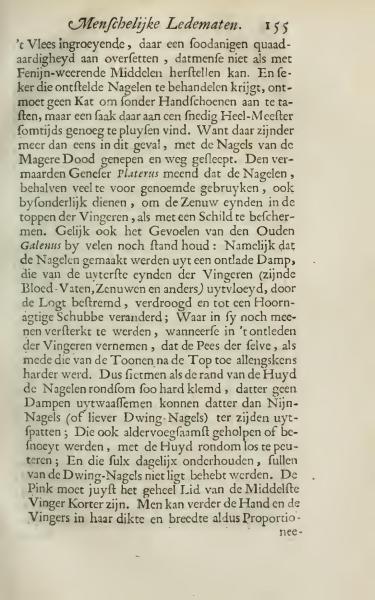Human Limbs.
When the flesh grows inward, such a condition develops that can only be remedied with strong medicine. Someone handling damaged nails should never approach the task without gloves, sometimes needing the skill of an experienced surgeon. For those have dealt with nails of the Grim Reaper, captured, and removed with care. The famed physician Platerus thought that fingernails, aside from commonly known uses, serve particularly well for protecting the nerve endings at the tips of fingers, like a shield. The ancient Galen's feeling still holds among many, specifically, that nails are created from a release of vapor emitted from the finger tips (being the blood vessels, nerves, and others), dried by the air, and turned into a horny scale. They get strengthened when, during the dissection of fingers, they realize the tendons likewise become tougher towards the ends of the fingers and toes. Thus, if the edge of the skin grips the nails so tightly that no vapors can escape, minor nails (or rather forced nails) burst aside; These should be gently assisted or trimmed, loosening the skin around them; and if maintained daily, the forced nails do not become troublesome. The pinkie must be slightly shorter than the entire joint of the middle finger. Furthermore, the hand and fingers can be proportioned in their thickness and width as follows:
Translation Notes:
1. "Menschelijke Ledematen" translates to "Human Limbs."
2. "Nagels van de Magere Dood" is translated as "nails of the Grim Reaper," symbolizing decay or deterioration.
3. "Geneeser Platerus" refers to the historical figure Platerus, noted for medical insights.
4. "Galenus" refers to Galen, the ancient physician, whose theories were widely influential.
